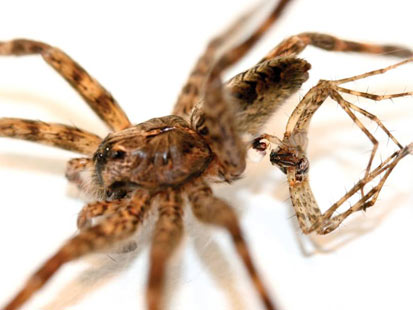Male Spiders Make Love, Not War, but Die Anyway
In a macabre display of affection, the male dark fishing spider (Dolomedes tenebrosus) dies shortly after it mates with a female, a new study in the journal Biology Letters finds. But unlike black widows, whose females are infamous for eating the males once the deed is done, the male dies on its own. According to the study, once the male transfers its sperm to the female, the clock starts ticking down until the male's demise.
The male begins courting the female by touching her legs and jiggling his abdomen back and forth. After the female spider positions itself, the spider releases its sperm from one of its engorged pedipalps (an appendage located at the front of its head), and then immediately seizes up, curling its legs and lying still.
Although it appears dead, the spider is technically still alive at this point.
"We measured the heartbeat, and it's still there," says Steven Schwartz, the author of the study and a behavioral ecologist at the University of Nebraska-Lincoln. However, it can't move and does not respond to any poking, prodding or other forms of physical stimulation. Less than three hours later, the heart stops beating and the male spider is officially declared dead.
Bee Sperm Bank: Scientists Saving Bees by Freezing Their Semen
The female spider does occasionally eat its catatonic partner in an act of sexual cannibalism before the male's time is up. Schwartz says that this is not the only spider to sacrifice itself upon mating. "The male redback spider actually somersaults into female's mouth parts to induce the female to eat him," he says.
As to why these spiders engage in these bizarre behaviors, to kick the bucket then and there, Schwartz hypothesized that it's linked to the reproductive effects. "Females that eat their partners are less likely to mate with another spider," he says. In addition, the female gives birth to more offspring that are bigger or survive better if it eats its mate.

Image Credit: Steven K. Schwartz/University of Nebraska-Lincoln
There are often more sexually mature male dark fishing spiders than females, so there's pressure to mate. Any advantage to passing on your own genes is a good one, even if it spells doom for the male. "Mating is the beginning of the end," said Schwartz.